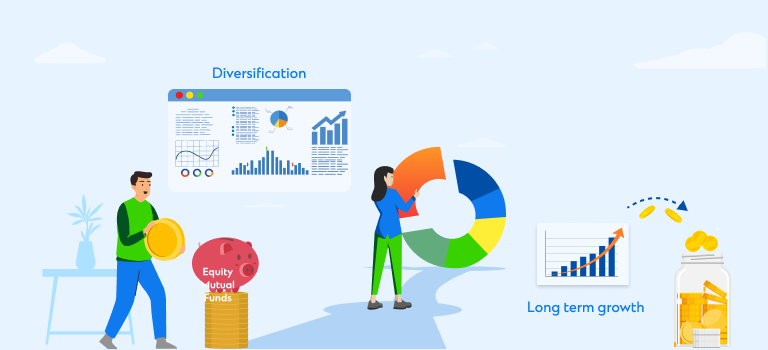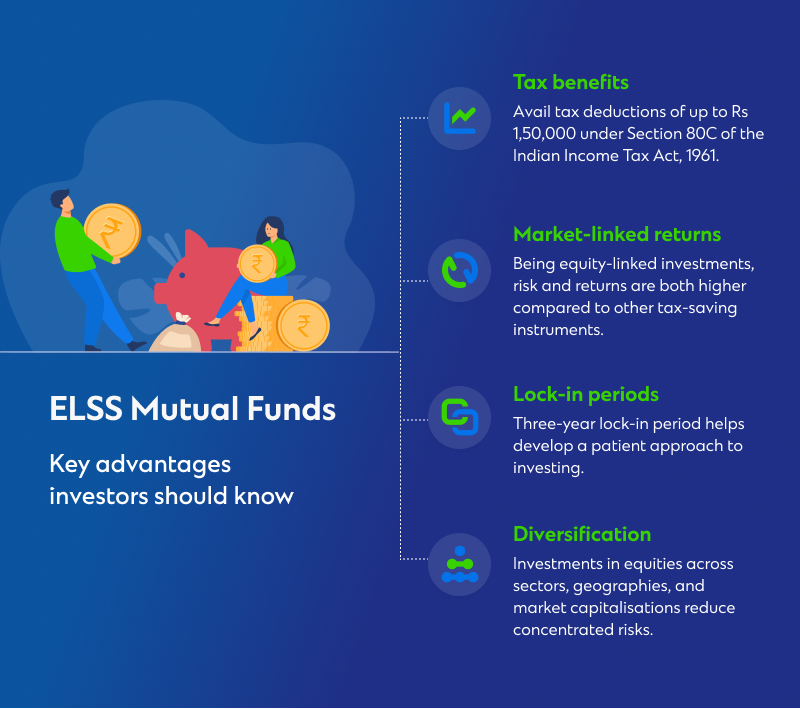

Table of Contents
Investing in mutual funds offers two important advantages: capital appreciation and income generation. However, there is also a third, often overlooked benefit that investors should take note of. Namely, tax-saving.
While returns on mutual funds generally carry tax implications, ELSS (Equity Linked Savings Scheme) mutual funds are unique in that they help you with long-term wealth creation while offering added tax benefits under Section 80C of the Income Tax Act. Intrigued? Here’s everything you need to know.
ELSS mutual funds: A smart addition to your portfolio
ELSS funds are a type of mutual fund that invest primarily in equities across sectors, geographies, and market capitalisations. The idea is to diversify risk, so that the underperformance of any one or a group of equities can be offset by gains from others.
What sets them apart from regular equity mutual funds is the tax benefits they offer. There are also two other caveats for a mutual fund to qualify as an ELSS mutual fund.
The first is a mandatory lock-in period of three years. One cannot redeem units in them before this period. Secondly, ELSS mutual funds must invest at least 80% of their money in equities.
ELSS mutual funds: What they bring to the table
ELSS funds offer you an opportunity to grow your wealth consistently, while leveraging the higher returns associated with equity markets and enjoying reduced tax implications. Here’s how:
i. Tax benefits
Under Section 80C of the Indian Income Tax Act 1961, one can avail tax deductions of up to Rs 1,50,000. Here, it is crucial to understand that these benefits are applicable only under the old tax regime, not if you opt for the new tax regime. Additionally, if you invest in other instruments under Section 80C, and the deductions on their returns are equal to or greater than the above amount, ELSS funds will be able to provide no tax benefits in such cases.
ii. Market-linked returns
Investing a majority of their corpus into equities, ELSS mutual funds have the potential to offer higher returns as compared to other tax-saving investment instruments under Section 80C, such as Public Provident Fund, National Savings Certificates, Tax Saving Fixed Deposits, and Life Insurance premiums.
But they also have a higher level of risk associated with them since equity markets are more volatile in nature. Moreover, since ELSS funds are market-linked schemes, they don’t guarantee returns on your investment. Their performance depends entirely on that of the underlying assets and the broader market. In contrast, instruments such as fixed deposits or PPFs guarantee stable, albeit lower returns.
iii. Lock-in periods
The lock-in period on ELSS funds is three years. This lets you develop a patient approach to investing and reap the benefits of compounding in the long run (Should you choose to continue investing in it after the same).
On the other hand though, this also means that ELSS funds offer lower liquidity, when you may need to pull your money out due to unforeseen expenses such as accidents and illnesses, or home repairs.
iv. Diversification
As mentioned earlier, ELSS mutual funds invest in equities (And to a smaller extent, other assets as well) across sectors, geographies, and market capitalisations.
This aims to diversify one’s investments, with a plan to limit the losses caused by the underperformance of a specific stock or sector, with profits from others.

Investing in ELSS funds with SC Invest: Your key to smarter wealth creation
Investing in ELSS funds is now more seamless than ever with SC Invest – our proprietary mutual fund investment platform. With access to over 300 mutual funds from 23 asset management companies, SC Invest offers you a host of features designed to simplify your investments. Some of these include curated SIP packs aligned with your desired investment amount and risk profiles, and Fund Select, which shortlists funds based on your risk profile. All of which ensures informed decision making at each step.
SC Invest also provides you with a consolidated view of your mutual fund holdings and their performance in real-time. Market Insights, on the other hand, delivers timely analyses and short- and long-term outlooks on different sectors, geographies, as well as market movements. The platform also lets your relationship manager generate investment orders on your behalf, which you can conveniently authorise on the go via an OTP, ensuring speed and convenience like never before.
Here’s how to set up an account on SC Invest to leverage its features and enhance and elevate your investment journey today.
ELSS funds have always made a strong case for themselves. And they continue to do so, owing to the tax benefits they offer and the three-year lock-in period, which instils consistency in investors.
If chosen wisely and held patiently, they can play a pivotal role in one’s long-term wealth creation journey.
FAQs for investing in ELSS mutual funds
Are ELSS funds suitable for first-time investors?
ELSS funds are a good starting point for young investors who would like to save on taxes while gaining exposure to equity markets. Bearing in mind how equity markets are fairly volatile, however, it’s important to assess your risk tolerance, as these funds are subject to market fluctuations.
Is there a maximum limit on investing in ELSS funds?
There’s no upper cap on how much you can invest in ELSS funds. However, the maximum tax deduction you can claim under Section 80C is capped at Rs 1.5 lakh in a financial year.
FAQs for investing in ELSS funds via Standard Chartered Bank
How to start investing in ELSS funds through Standard Chartered Bank?
To begin investing with Standard Chartered Bank, you first need to have a savings account with us. Once that’s done, you will be eligible to open an investment account with us.
How to open an investment account with Standard Chartered Bank?
Do I need to pay any charges or fees to start investing in mutual funds through Standard Chartered Bank?
No fees are levied for any investments through Standard Chartered Bank.



